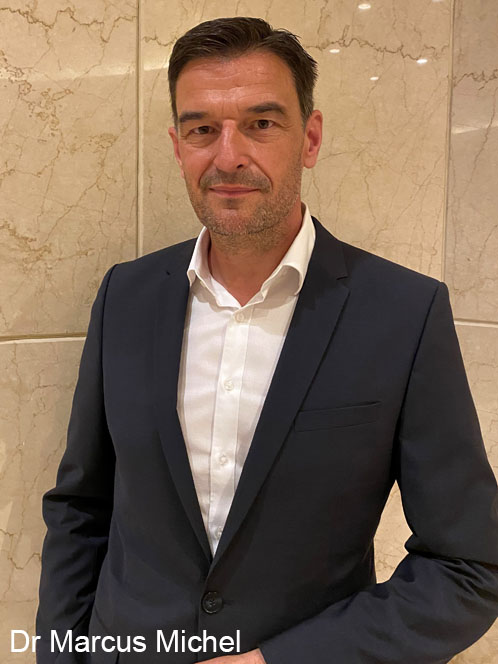To set the scene, I ask Dr Michel what values he considers to be most important for his work as a leader in the pharmaceutical engineering sector. “Principles are hugely important,” he says: “At ACG, we’ve worked on our wider company values and developed a set of specific internal goals to be collaborative, caring and progressive."
"These guide how we work with our associates, our customers and how we operate within our business units; our mission is to be and make the world healthier together.”
“For more than 60 years, we have been committed to doing this by providing materials, equipment and technology to the pharmaceutical industry, helping our customers to provide products to end users so they can have a better life."
"Demonstrating these values through starts with the behaviour of our senior leadership team. Our values have been embedded in our business strategy and are cascaded throughout the entire organisation.”
KSR: What hurdles do you see pharmaceutical companies facing today and in the near future?
MM: One of the biggest challenges currently affecting the pharmaceutical industry is supply chain disruption. This started in 2020 during the COVID pandemic and, during the last 2 years or so, has intensified.
At ACG, we have to be agile to respond to the situation and learn how we are going to live with the disruptions that will continue.

Talent shortages are also creating difficulties for the industry; finding qualified associates and professionals has become an onerous task. The sector needs people with an understanding of the drug manufacturing processes to be able to overcome the increasingly apparent difficulties.
One of these is the issue of how to collect, manage and analyse large volumes of data whilst ensuring security and effective encryption.
We are also seeing an increase in the demand for transparency; patients want to know what’s in their prescribed drugs, which, in turn, means that quality and the validation of equipment in the supply chain is under a more intense spotlight.
KSR: ACG is launching a second Process Development Lab in Germany in 2023; what are the aims of this project?
MM: As a global company, we are working in both developed and developing regions. Following the very positive response from customers using the lab facility in India — where we provide a controlled environment for them to develop and test new products — we decided to add a similar facility in Germany.
This will help to reduce and manage time-consuming travel from Europe to India.
The aim is to provide an accessible, central regional testing and development facility to support our European-based customers with their product development — offering them a platform to not only develop but to also collaborate … and to help them to become more familiar with our products and technologies.
KSR: How are you attracting top talent and experts to work in this facility?
MM: To address this much-debated industry challenge, we’re looking at recruitment in two ways. One is by searching for appropriate personnel and the other is to retain. With a worldwide footprint, we’re able to provide the opportunity for colleagues to travel, work on individual projects and, if they wish, to relocate.
We also connect with academia and collaborate with universities — working on sponsored investigations and dedicated development projects. Equally important is the education and development of our staff to advance their knowledge.
In addition to training schemes, we encourage peer-to-peer knowledge transfer, enabling staff to work closely with more experienced associates in our team.
KSR: How has the work you’ve done at the laboratory in India fed into the development of the new German facility?
MM: We selected Germany because we already have an established design and engineering facility there — our Center of Competence. It therefore made logistical sense to locate the new lab in the same place, allowing us to provide product development and testing facilities hand-in-hand with other competencies.
Our experiences in India have given us a really comprehensive overview of what customers are looking for. Having said that, the lab will not be a complete carbon copy of the one in India, it will be tailored to the specific needs of the regional customer base in Europe.
KSR: What role will education and training play at these facilities?
MM: The lab will create a platform to host customers training sessions; it’ll be a place where they can learn more about ACG machines, equipment and process solutions.
We’ll also provide regular training sessions to increase the competencies of our own staff. Overall, this type of collaboration will lead to better-informed discussions, exchanges and discovery conversations with our customers.
KSR: Which developments or projects are you most excited about within the pharmaceutical industry?
MM: Pharma 4.0, digitisation and automation; these are game changers for the industry and will help it to undergo a complete digital transformation. This will lead to exciting changes and developments in the next generation of machines, such as equipment that optimises both efficiency and output during its entire lifetime.
There are also massive amounts of data being created in the industry, and how we use this moving forward is hugely exciting. Utilising smart connected machines and the IIOT helps our customers to combine reality with the digital environment.
KSR: How is ACG Engineering driving innovation in the pharmaceutical sector?
MM: ACG machines and processing technology are prepared and equipped for the future. Our focus is very much on enhancing processes and working to reduce downtime. We are also changing how we optimise our equipment.
For example, we are looking at digital twins during design and maintenance and how we replicate the results in the real world to increase outputs and the lifetime of our machines. Sustainability is also a driving force in our innovation.
This includes changes to the raw materials that are being used and how we can reuse, recycle and reduce to create sustainable concepts in the design of our machines for a healthier future.
